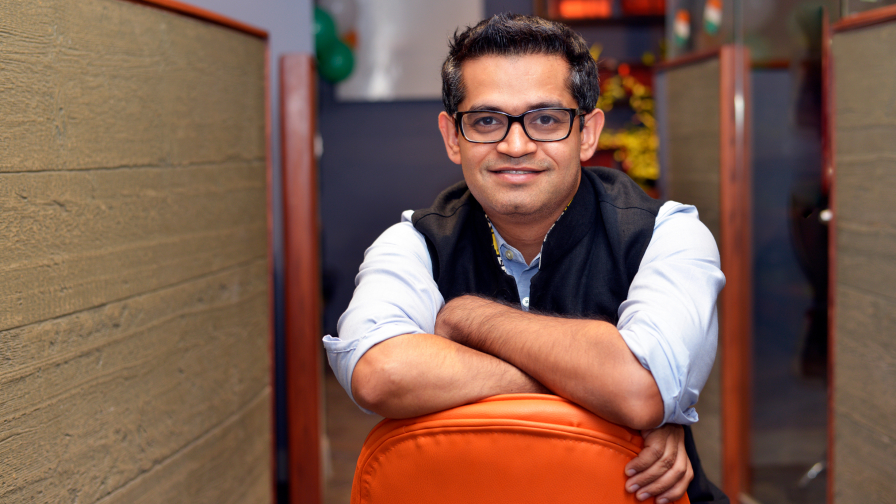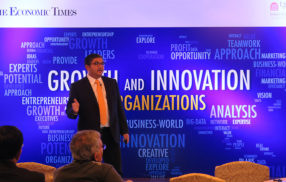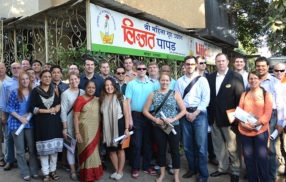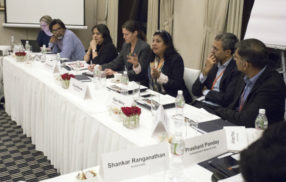
Digital India: UVA Darden Alumni Lead Etsy, PayPal Into India’s Digital Revolution
By Dave Hendrick
The digital opportunity in India is growing at a staggering pace.
Driven by a confluence of factors, notably the rapid proliferation of smartphones — about 337 million, or more than the entire population of the United States, in India own one, according to the research firm eMarketer — the country is riding a wave of technology-enabled growth across a variety of sectors.
The official government policy of demonetization, a controversial move to remove large denomination bills from circulation, has also pushed the country toward a digital future, and eMarketer expects e-commerce to represent a $32.7 billion industry in the country in 2018, a 31 percent year-over-year increase. More than a quarter of the country’s population are now digital shoppers.
Two University of Virginia Darden School of Business alumni with similar career trajectories, including formative years spent in Silicon Valley before returning to India, are playing key roles in the country’s growth and maturation, offering a front-row perspective on the changes sweeping the country.
They are part of a thriving Darden network in India, a group that includes entrepreneurs, consultants and business leaders working in variety of sectors.
Linking Artisanal Crafts to the Global Marketplace
Himanshu Wardhan (MBA ’11) was happily living the Silicon Valley lifestyle, working at a startup he founded following post-Darden stints at McKinsey & Co. and Hewlett-Packard, when he began to take notice of the activity transpiring in India’s technology sector. Wardhan, who completed his undergraduate studies in Delhi, said capital and global talent seemed to be flooding into the Indian market beginning in 2014, and recalled his inbox suddenly filled with excellent opportunities in his home country.
Eventually, Wardhan received an offer compelling enough to prompt his return to India, joining the online crafts market Craftsvilla as head of operations, before moving to his current position leading the global online crafts giant Etsy in India.
As managing director, Wardhan is building the company’s presence from scratch, assembling a team from the company’s Delhi-based headquarters and working to build and grow a community of sellers and buyers of artisanal projects.
Wardhan said the company, whose physical presence in India is little more than a year old, focuses its seller cultivation on three distinct groups:
- Professional designers and artists with brick-and-mortar storefronts interested in a platform to reach out to global consumers.
- Hobbyists and part-time entrepreneurs
- People engaged in traditional Indian art forms, many of whom have been practicing their craft for generations.
Wardhan’s marketing team conducts workshops across India to introduce the Etsy platform and, in some cases, the Internet itself. In addition to the proliferation of smartphones, Internet access itself can be as little as $3 a month, putting global markets within reach of a huge swath of the country, Wardhan said.
“The new generation is a lot more digitally enabled,” Wardhan said. “If we do the initial hand-holding, they can learn from it and work and build.”
Wardhan described the deliberate, homegrown approach of Etsy as emblematic of the current generation of tech companies in India. Whereas previous generations of e-commerce companies were often primarily exporting foreign business models to the market — often with poor results — Wardhan said he increasingly sees companies being far more aware of the unique realities of the Indian market and consumer.
A similar maturation is playing out in the startup ecosystem, he said, and Darden alumni can be found across the startup community, with alumni-led ventures such as Udaan and ZipGo among a host of ventures attracting significant capital and attention.
“When I moved back from the Valley to India, I observed that a lot of entrepreneurs really wanted to move fast, but a lot weren’t building for the long-term,” Wardhan said. “Now entrepreneurs have become more focused on the medium or long-term. It’s not just about coolest or hottest thing, but about doing things they really believe in.”
Which is not to say they are not still moving fast, of course.
“I thought things in California and at Darden moved fast,” Wardhan said. “The pace of change that is happening in India in some of these industries like payments and e-commerce is incredible.”
Ushering in the Digital Payments Revolution
Self-described “growth junkie” Gunjan Shukla (MBA ’09) intended to go into venture capital before the global recession rerouted his career through Nationwide Insurance in Columbus, Ohio.

Gunjan Shukla (MBA ’09)
As a director of finance at the insurance giant, he led a team of analysts charged with helping the company make strategic investments in new products, new markets and new technologies.
After three years in the Midwest, Shukla’s desire to lead a high-growth technology outfit led him to Silicon Valley, where he was part of the team that led Visa’s efforts to plant a flag in the mobile and online payments space, overseeing acquisitions of smaller payments startups and helping the company push into a critical new area.
“Visa was great, but I wanted to work for a smaller company and help them scale,” Shukla said, explaining his move to the peer-to-peer lender LendingClub, where he led a large finance team as vice president of finance.
After more than five years in Silicon Valley, professional and personal factors converged to lead Shukla back to India, where since 2017 he has served as CFO of PayPal in India, helping to establish and grow the U.S.-based payments giant through what Shukla called an “inflection point” in digital payments following the government’s demonetization push.
“My key job is not just to manage financial performance of the business but to work closely in formulating the strategy for the business in India,” Shukla said. “As a finance guy, you have to know the product and technology really well in order to help the leadership team take the right decisions.”
The company formally launched domestic operations in India in fall 2017 after enabling cross-border transactions for close to a decade. Shukla said the company benefits from the enormous number of smartphone-enabled consumers, as well as from the government’s vision for a “digital India” with steps planned to lead more citizens into the digital ecosystem.
“The opportunity is immense,” said Shukla. “There is a huge consumer population, but also small- and medium-scale businesses. Similarly, when we look at sellers, we see very interesting things with many freelancers selling services across globe.”
Shukla further echoed Wardhan’s observation of a maturing technological ecosystem, which he said continues to entice talented people from around the globe to seek opportunities.
“As the opportunity in India is increasing, we are seeing more and more people coming back from the U.S. or other places and either starting their own business or helping other people grow and scale,” Shukla said.
Helping to launch a new technology platform in a land of well over 1.3 billion was an invigorating challenge, he said, just the sort of job his professional and academic career had positioned him to execute.
“Darden has given me so much confidence, in terms of if there is anything new, or an ambiguous space, I feel very well positioned,” Shukla said. “The Darden toolkit allows you to always feel confident about taking up a challenging new assignment.”
The University of Virginia Darden School of Business prepares responsible global leaders through unparalleled transformational learning experiences. Darden’s graduate degree programs (MBA, MSBA and Ph.D.) and Executive Education & Lifelong Learning programs offered by the Darden School Foundation set the stage for a lifetime of career advancement and impact. Darden’s top-ranked faculty, renowned for teaching excellence, inspires and shapes modern business leadership worldwide through research, thought leadership and business publishing. Darden has Grounds in Charlottesville, Virginia, and the Washington, D.C., area and a global community that includes 18,000 alumni in 90 countries. Darden was established in 1955 at the University of Virginia, a top public university founded by Thomas Jefferson in 1819 in Charlottesville, Virginia.
Press Contact
Molly Mitchell
Senior Associate Director, Editorial and Media Relations
Darden School of Business
University of Virginia
MitchellM@darden.virginia.edu








